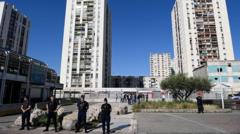On June 6, 2025, Defense Secretary Pete Hegseth attended the 81st anniversary of D-Day at Normandy, France, where he honored the legacy of soldiers who fought bravely during World War II. His remarks come in light of recent diplomatic controversies, marking his first European visit since he was criticized for disparaging NATO allies. Speaking with great reverence before a crowd of veterans and dignitaries, Hegseth emphasized the collective sacrifices that made the Allied victory possible.
### Tensions in Commemoration: A Reflection on D-Day and Contemporary Challenges

### Tensions in Commemoration: A Reflection on D-Day and Contemporary Challenges
In an era filled with geopolitical strains, the commemoration of D-Day reveals the complex dynamics among allies.
The ceremony, attended by about two dozen World War II veterans, many of them centenarians, resonated with nostalgia. Hegseth underscored the essential role of unity among nations, recalling how the Allied forces triumphed against tyranny in 1944. His acknowledgment that "without the sacrifices of American, French, British, and other Allied powers, we would not have a free world" was met with relief from those present.
However, beneath this somber tribute lay palpable anxiety over current geopolitical tensions, particularly regarding U.S. foreign policy and the perception of European partners. Hegseth’s earlier critiques of allies as "pathetic" and expressions of frustration at financial burdens within NATO have left diplomatic scars, even as he expressed solidarity on this significant anniversary.
The commemoration was not just a remembrance of military valor but also a stark reminder of the importance of dialogue and cooperation among nations in the modern landscape—a call to transcend previous disagreements to address current threats that may challenge global stability.
In remembering D-Day, it remains imperative to reflect on the lessons of the past, ensuring that alliances are maintained and strengthened in pursuit of a secure future.
However, beneath this somber tribute lay palpable anxiety over current geopolitical tensions, particularly regarding U.S. foreign policy and the perception of European partners. Hegseth’s earlier critiques of allies as "pathetic" and expressions of frustration at financial burdens within NATO have left diplomatic scars, even as he expressed solidarity on this significant anniversary.
The commemoration was not just a remembrance of military valor but also a stark reminder of the importance of dialogue and cooperation among nations in the modern landscape—a call to transcend previous disagreements to address current threats that may challenge global stability.
In remembering D-Day, it remains imperative to reflect on the lessons of the past, ensuring that alliances are maintained and strengthened in pursuit of a secure future.





















